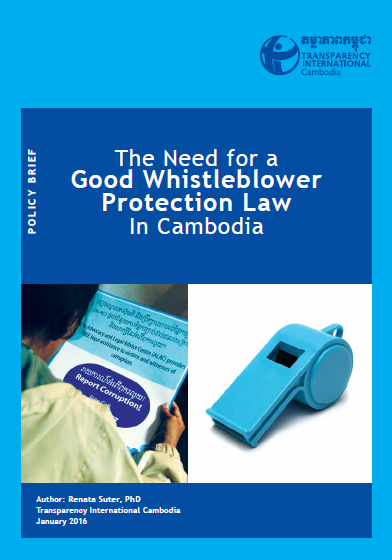
The Need for a Good Whistleblower Protection Law In Cambodia
Publication Year: 2016 / Sources: Transparency International CambodiaWhistleblowers play a crucial role in the fight against corruption. In order to encourage them to speak up, legal protection is essential. However, the Cambodian Law on Anti-Corruption as it stands might have a deterrent effect on speaking up, as proper protection for whistleblowers that report in good faith is not assured and the threat of imprisonment exists (Article 41).
Download: English | Khmer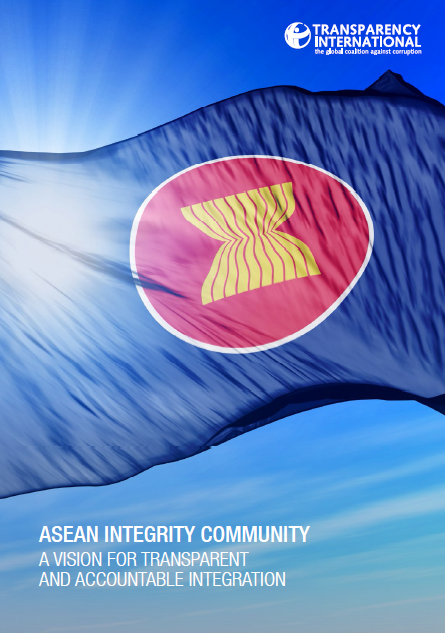
ASEAN Integrity Community: A Vision for Transparent and Accountable Integration
Publication Year: 2015 / Sources: Transparency InternationalThis report first provides a snapshot of where the ASEAN region now stands in terms of anti-corruption, analysing the specific corruption risks ASEAN is facing and providing concrete proposals for increased future cooperation through the ASEAN Integrity Community.
Download: English | Khmer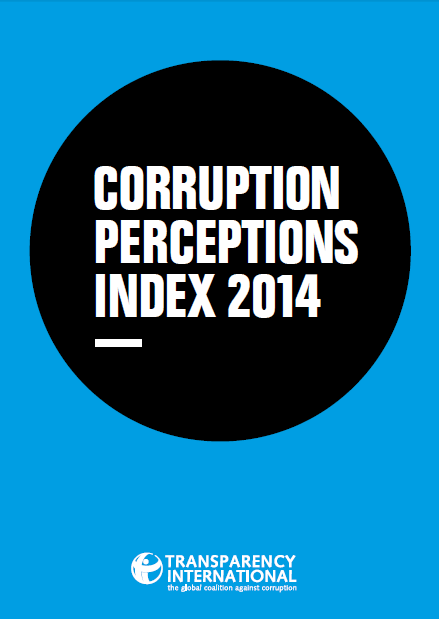
Corruption Perceptions Index 2014
Publication Year: 2014 / Sources: Transparency InternationalBased on expert opinion from around the world, the Corruption Perceptions Index measures the perceived levels of public sector corruption worldwide, and it paints an alarming picture. Not one single country gets a perfect score and more than two-thirds score below 50, on a scale from 0 (highly corrupt) to 100 (very clean).
Download: English | Khmer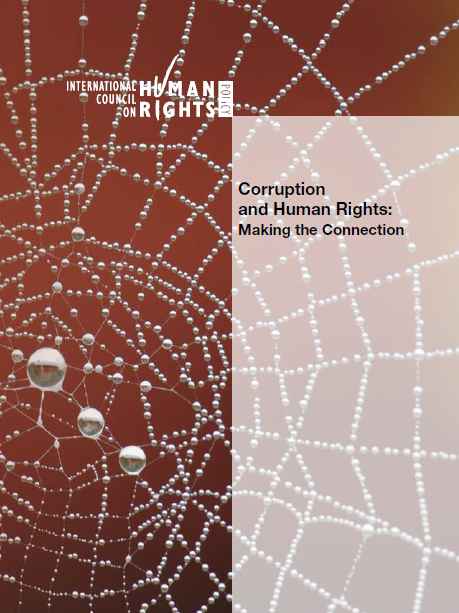
Corruption and Human Rights: Making the Connection
Publication Year: 2009 / Sources: International Council on Human Rights PolicyThe aim of this report is, therefore, first, to show how links between acts of corruption and violations of rights can be described accurately; and second, to distinguish cases where acts of corruption do imply violations of rights from cases where they do not. It is hoped that, if the links between corruption and human rights are made clear, organisations and agencies working in the field of human rights may see the value of collaborating more closely with national and international anti-corruption agencies, and vice versa.
Download: English | Khmer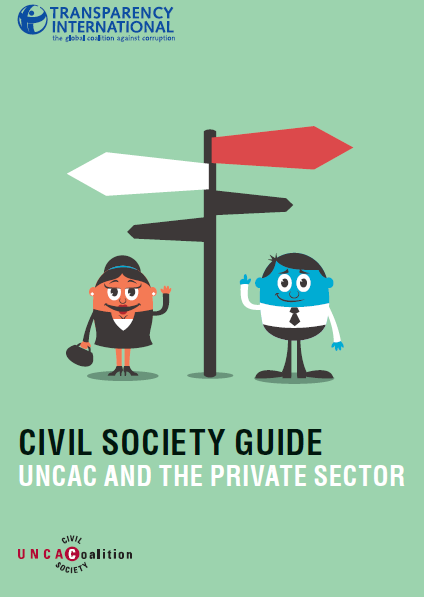
Civil Society Guide: UNCAC and The Private Sector
Publication Year: 2013 / Sources: Transparency InternationalTransparency International (TI) has produced this practical guidance booklet to assist civil society organisations (CSOs) in engaging with companies to promote implementation and inclusive monitoring the United Nations Convention against Corruption (UNCAC) in their local context.
Download: English | Khmer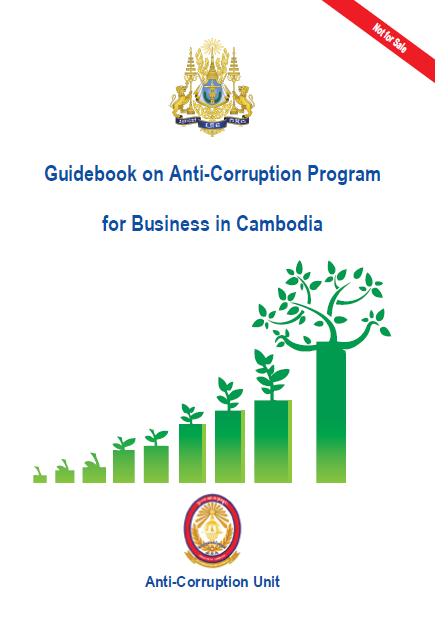
Guidebook on Anti-Corruption Program for Business in Cambodia
Publication Year: 2015 / Sources: Anti-Corruption UnitBoth in the Cambodian and globalization context, increasing private sector players understand clearly their roles and responsibilities and they have even actively involved in initiatives to ensure that their businesses are conducted with integrity, transparency and accountability.
Download: English | Khmer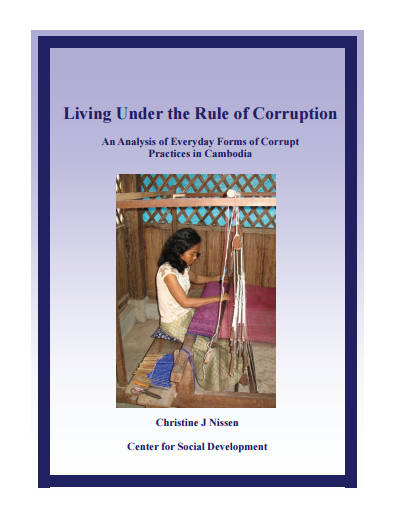
Living Under the Rule of Corruption
Publication Year: / Sources: Center for Social DevelopmentThis report is the qualitative component of this research project which focuses on local-level corrupt practices. It mirrors the families and household’s concrete experiences with corrupt practices, the effects these practices have on their lives, and their ways and strategies of coping with corruption.
Download: English | Khmer
United Nations Convention Against Corruption
Publication Year: 2003 / Sources: United NationsThe purposes of this Convention are to promote and strengthen measures to prevent and combat corruption more efficiently and effectively; to promote, facilitate and support international cooperation and technical assistance in the prevention of and fight against corruption, including in asset recovery; and to promote integrity, accountability and proper management of public affairs and public property.
Download: English | Khmer
Law on Associations and Non-governmental Organizations
Publication Year: 2015 / Sources: National Assembly of the Kingdom of CambodiaThis law aims at safeguarding the right to freedom of establishing associations and non-governmental organizations in the Kingdom of Cambodia in order to protect their legitimate interests and to protect the public interest, as well as to promote partnership cooperation between associations and non-governmental organizations and the public authorities.
Download: English | Khmer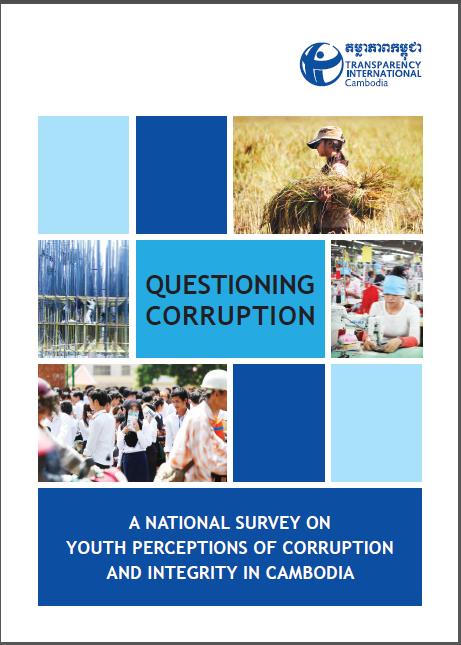
Questioning Corruption: A National Survey on Youth Perceptions of Corruption and Integrity in Cambodia
Publication Year: 2015 / Sources: Transparency International CambodiaIn Cambodia 65 per cent of the population are under the age of 30, and more than 30 per cent are youths. Consequently, ensuring youths are more engaged in society is vital for campaigns to promote integrity and eradicate corruption. The Youth Integrity Survey is designed to understand and quantify attitudes to – and perception of – integrity and corruption among this key demographic. This nationally representative survey, the first of its kind, surveyed 1,200 people aged 15 to 30 nationwide. The results can provide evidence and data to government bodies and other organisations looking to deepen their understanding of youths and identify key areas for directing anti-corruption initiatives.
Download: English | Khmer